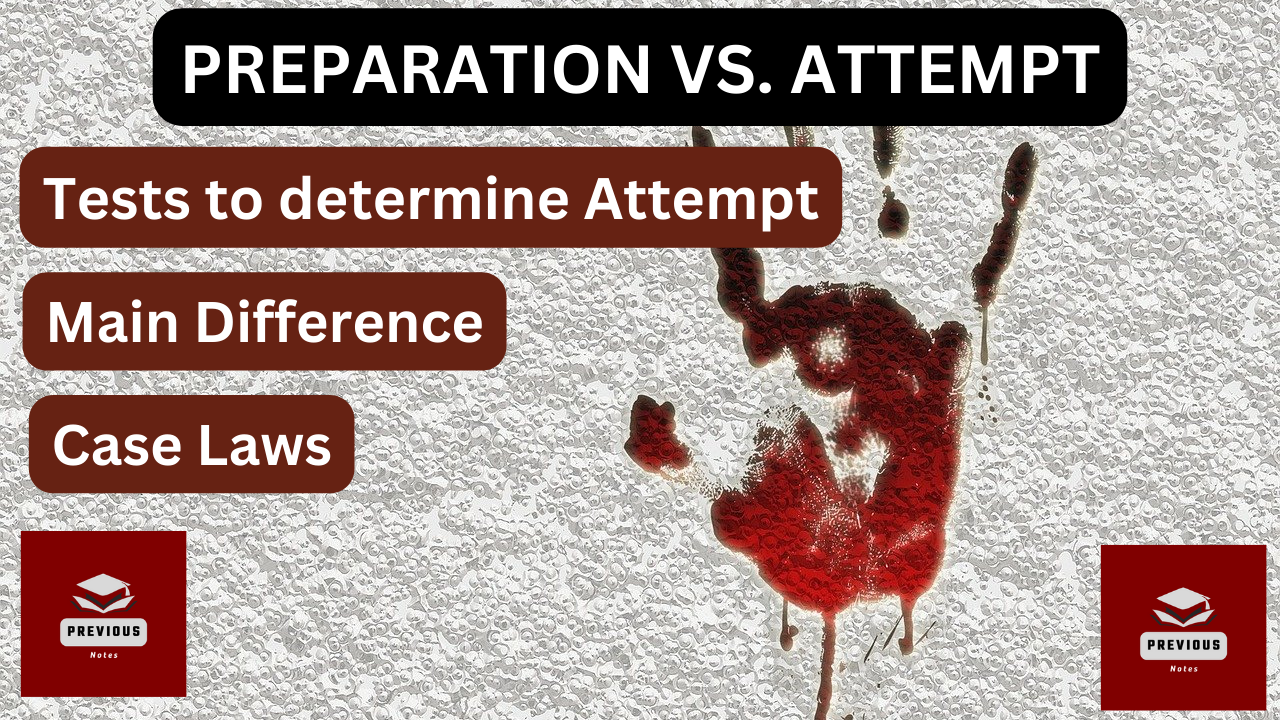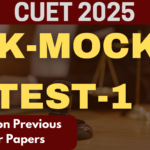Tests to Determine Attempt and Preparation:
Preparation vs. Attempt:
Many times it is difficult to identify or determine the culpability of a person whose act is a borderline between preparation and attempt. If it is considered as Preparation then the person is not liable and if it is considered as Attempt then the person will be held liable.
There is no universal test/rule which can determine whether a particular act is preparation or attempt. Whether the act is at the stage of preparation or it has reached the stage of attempt depends on the facts and circumstances of each case.
However there are some test/principles which helps to determine whether a particular act is at the stage of preparation or attempt.
Read Related Articles to this Topic:
• Proximity Rule:
- If an act or acts is sufficiently proximate to the crime intended or to the accomplishment of the intended substantive offence, it will be considered at the stage of Attempt.
- If the act is not proximate to the crime intended, it is considered at the stage of preparation.
Case Law:
Abhyanand Mishra vs. State of Bihar:
Fact:
- The accused prepared false experience certificate for appearing in MA Examination of Patna University.
- Roll No. Was issued to him.
- On Complaint & inquiry, his candidature was cancelled.
- He pleaded that he was only at the preparation stage and can’t be held liable.
Court: Held that his act was an attempt not the preparation stage, Court applied proximate rule while determining the stage.
State of Maharashtra Vs. Mohd. Yakub:
Fact:
- The accused was arrested by the official of Central Excise for attempting to smuggle silver out of India.
- Accused was arrested when they were found to have kept some small and heavy parcels on the ground.
- Sea/Craft was also heart.
Court: Court applied the proximity rule and held that they were very near to the accomplish the act and can’t be held as they were at the preparation stage, trial court convicted the accused of attempting to smuggle silver out of India.
• Doctrine of Locus Poenitentiae:
- If there is possibility of back out of committing an illegal or criminal act or the accused have the opportunity to back out due to any reason, due to change of heart or due to fear or any compulsion. Then the act will be treated as at the preparation stage only.
- If the person has lost the opportunity to back out or there is no possibility to back out, it means the attempt has been made.
Case Law:
Malikat Singh V. State of Punjab
Fact:
- Truck driver was accused to smuggle paddy out of Punjab.
- Truck was intercepted 14 miles away from Punjab Delhi border.
- Paddy was also recovered.
- They were charged with the offence of attempting to smuggle the paddy.
Court: Court held that they were still at the preparation stage. They had the opportunity to back out as they were 14 miles away from the border. Court used the doctrine of Locus Poenitentiae.
• Unequivoality Teat (Unambiguous/No doubt)
- It act beyond reasonable doubt referable to the commission of the crime and speak itself, it will be treated as attempt.
- The conduct of the accused himself clearly indicates his desires to translate the intention into action.
- If it is clear that the act done is translating the intention to commission of crime it means attempt has been made other it is in the preparation stage.
Example: In a case of attempt to commit murder by fire arms, till he fires, he does not do any act it means he is at the preparation stage, the movement he fires; it means it clearly shows his conduct, it means he has committed the act toward the commission of the crime.
State Vs. Parasmal &Ors. It was observed that when a person intends to commit a particular offence, and then he conducts himself in such a manner which clearly indicates his desire to translate the intention into action, it means he has committed an attempt to commit a particular offence.
You May Also Like:
Euthanasia in India, Right to die with Dignity
Right to Privacy Case Law Mr. X vs. Hospital Z
Federal Constitution Definition and key points
University of Madras vs. Shantabai,1954: Article 12 Case Law
Article 20 Fundamental Right with Case Laws
Article 19 Fundamental Right of Indian Constitution with 10 Case Laws
Article 358, 359 Fundamental rights during emergency
Parliamentary Privileges and Fundamental Rights with Case Laws
Article 14 Fundamental Right with Case Laws
Specific Principles of Criminal Law | LLM Previous Year Paper 2024 | CCSU
Specific Torts | LLM 4th Semester Previous Year Paper 2024 | CCSU
History and Basic Principles of Criminal Law | Previous Paper 2023
LLM Previous Year Paper 2023 | PRIVILEGED CLASS DEVIANCE
PENOLOGY PREVIOUS YEAR PAPER | LLM | CCSU


















Leave a Reply